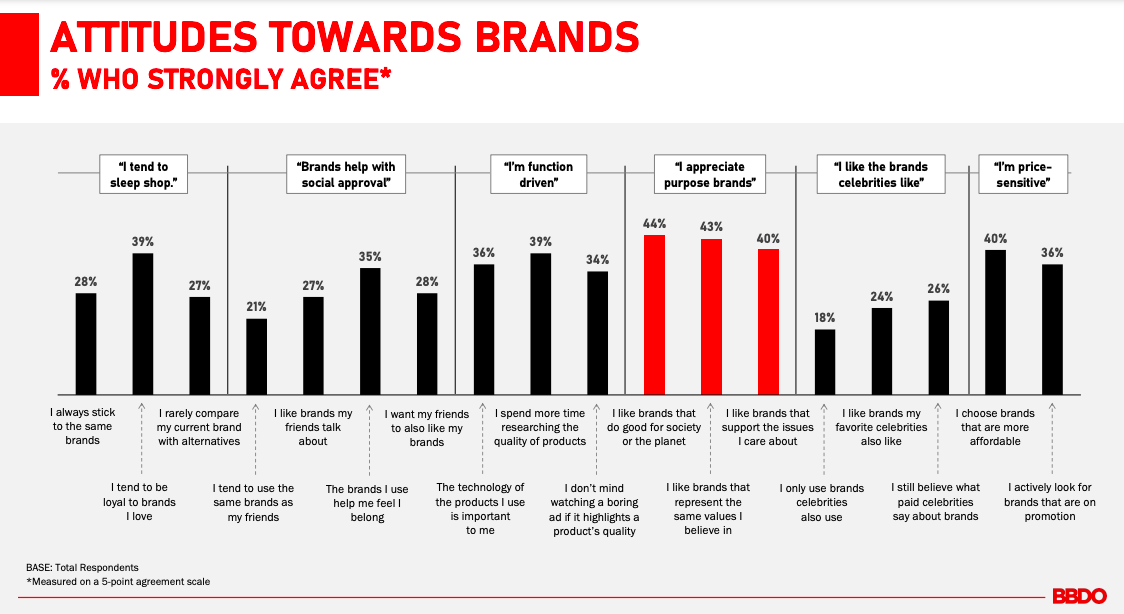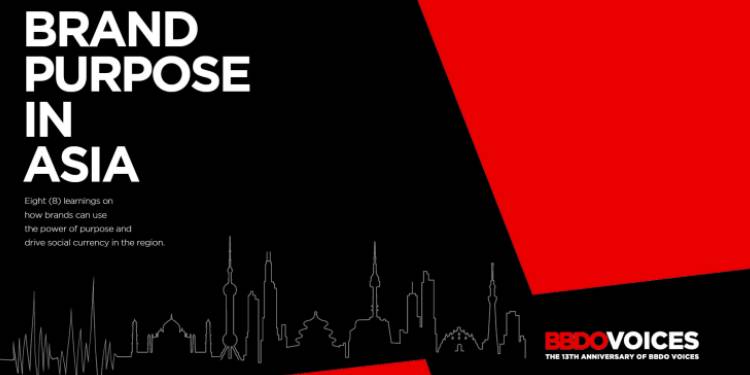BBDO Asia, one of the leading advertising networks in Asia announced this week the release of its 13th edition of BBDO Voices titled “Brand Purpose in Asia.” The 45-page report looks at the growing relevance of Brand Purpose in Asia through its study of consumers from markets such as Mainland China, Korea, Japan, Thailand, Philippines, and India.
Asia is home to more than half of the world’s population. Its booming economy and glittering cities are testimony to the so-called “Asian miracle”, that has lifted half a billion people out of poverty over the last few years. Yet many of its countries still face tough challenges that will determine whether they can continue their path to prosperity or fall victim to economic stagnation, social unrest, and political instability. These challenges include a lack of gender equity, transparency and accountability in government, persistent income inequality, and not much support for the rise of LGBT communities. On top of these, many countries in Asia have been hit hard by natural disasters caused by climate change. In the meantime, Asia’s Gen Z is coming of age, deeply concerned with the state of the world and committed to driving social change themselves.
According to BBDO Asia’s latest report, much of Asian consumers are looking to a surprising ally to help them fill these gaps and meet these challenges where national institutions often cannot or will not – brands.

“Asian consumers are looking to brands and companies to be part of the solution rather than the problem, and our findings show promoting a brand or company’s values helps drive shareholder value. However, there are many ways companies can easily do brand purpose ineffectively. Our analysis provides valuable insight on how to leverage purpose while avoiding common pitfalls,” says Hans Lopez-Vito, COO of BBDO Asia who led the study.
The report highlights expert opinions and consumer survey results from six Asian markets, outlining how brands can drive social currency by using purpose, along with key consumer insights that marketers need to know to be able to reach and connect with consumers within this region.
Consumers from economies like Philippines and India look to brands the most to play a significant role in society. In these countries which are highly vulnerable to the effects of global warming, consumers need brands to champion sustainability. Moreover, citizens here also want brands to make products affordable for all, and help local communities thrive (e.g., via use of local ingredients, help on government initiatives, etc.) in order to alleviate the urgent challenges of life.

As far as Indians attitude towards brand purpose are concerned, 65 pc voted in favour of brands that stand for the good of society or planet. 64 pc believe in brands that represent values and 61 pc liked brands that support the issues they care about.

“A nation throbbing with first world ambition is dampened by third world infrastructure. A large population of young India has to face resistance from old conservative mindset. Apathy of state towards bettering basic quality of life and lack of any cultural playbook that older generation can tap into to respond to new emerging narratives, compels Indians to look up to brands as change-makers! We expect brands to leverage their resources in making meaningful impact beyond sales. Brands can provide social sanction to new ideas, they can bridge the infrastructure gap, they can right any wrong that comes in the way of progress and thus become a catalyst to fulfilling our first world aspiration.” Suraja Kishore, CEO – BBDO India
Among the four major trends identified to watch for 2023 are:
Climate change to likely speed up the importance of brand purpose.
Environment and sustainability issues are the leading social topic Asian consumers want brands to champion the most today. As the effects of global warming intensifies, more consumers will look to brands to embrace a sense of urgency and be part of the solution rather than the problem. When this happens, brand purpose will significantly impact brand and customer relations much more than now.
Brand purpose will become ´de rigueur` for marketers as Gen z asian consumers come of age and take over society.
While traditional mindsets and narratives still persist in the region, those under 25 demonstrate progressive voices on issues like LGBT+ acceptance and advocacy. They will expect brands to be their voice, and brands that do not stand for a social purpose will lose social currency.
Brands will increasingly have the same accountability as quasi-government bodies.
This is especially true in the developing regions of Asia where consumers are 20% to 40% more likely to have sought out brands due to its perceived impact on society. Here, citizens expect brands to step up and fill gaps which public governance systems often cannot. In this sense, consumers in developing parts of Asia will continue to expect brands to embrace the same agenda as governments.
Brand purpose in Asia will have Asian Characteristics:
Brand purpose in Asia can never exist in a vacuum. Among those who bought a purpose brand within the three months prior to the survey, 6 out of 10 also bought it for its functional characteristics. To be relevant to the region’s consumers, a brand purpose narrative will always need to be rooted in what the product or service is supposed to functionally deliver. It also needs to be supplemented by rational/functional content along the customer journey.
“Marketers should take notes on the attitude and trends we see towards brand purpose. Advertising needs to be bold and reflect the world we live in. In the past we’ve seen brands with purpose make a big difference, but also improve their bottom line. We’ve seen efforts like P&G India’s #SharetheLoad campaign impact society long-term, and Unilever has said that their purpose brands are growing faster than others. We’ve clearly seen that purpose-driven brands have a big impact on Asian markets, but the effect goes beyond regional borders. In the Middle East, last year, we saw how a brand even restored local elections through a campaign dubbed the ‘Election Edition’. This just goes to show that brand purpose has the power to effect real change in the world,” added Lopez-Vito.
Download the report here.

















